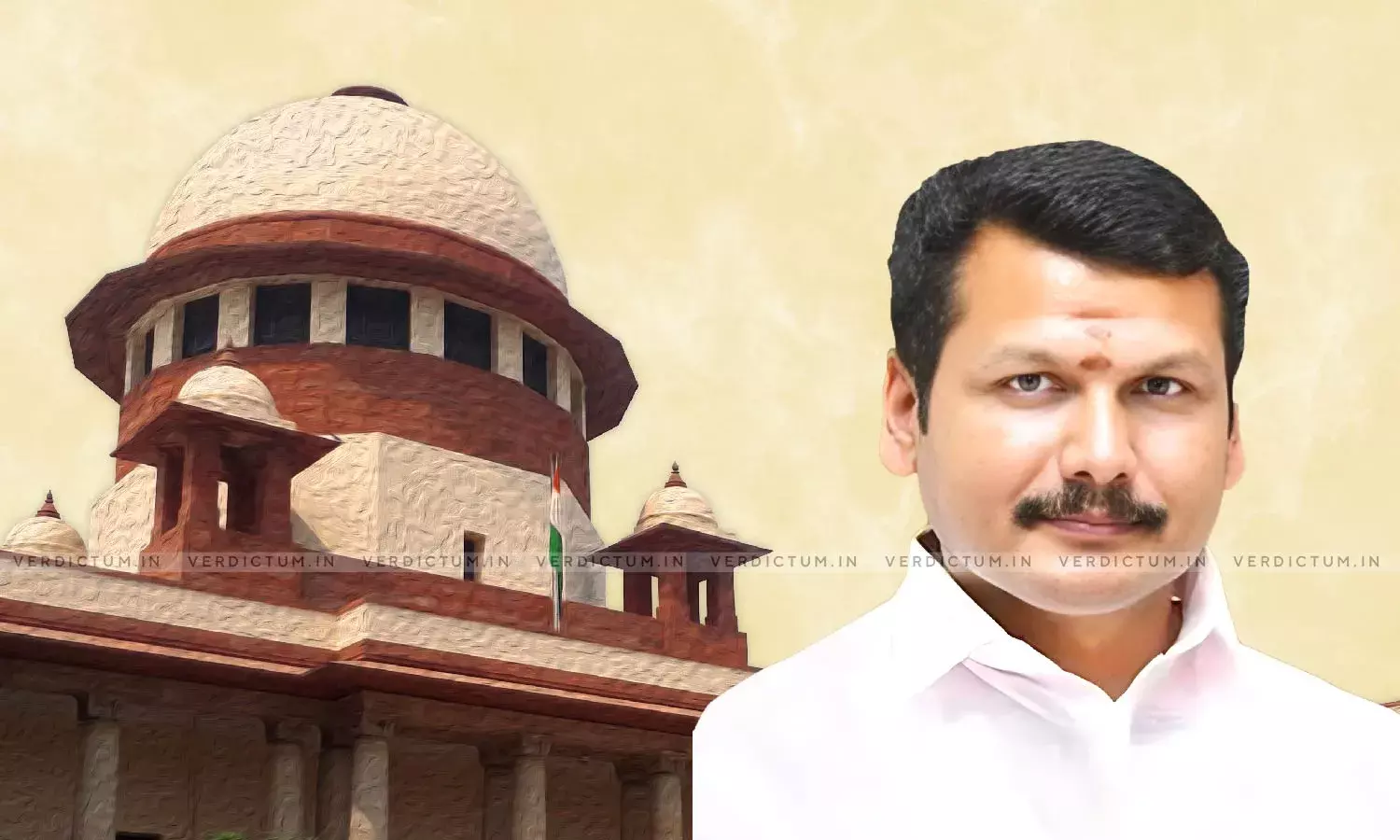Writ Of Habeas Corpus Is Maintainable Only Incase Of Illegal Detention: SC While Dismissing Appeals Challenging Arrest Of TN Minister Senthil Balaji

The Supreme Court yesterday dismissed the appeals filed by Tamil Nadu Minister V. Senthil Balaji and his wife challenging the Madras High Court's order whereby his arrest was upheld with regard to a money laundering case.
The Court said that a writ of Habeas Corpus is maintainable only when there is an illegal detention.
The two-Judge Bench comprising Justice A.S. Bopanna and Justice M.M. Sundresh held, “A writ of Habeas Corpus shall only be issued when the detention is illegal. As a matter of rule, an order of remand by a judicial officer, culminating into a judicial function cannot be challenged by way of a writ of Habeas Corpus, while it is open to the person aggrieved to seek other statutory remedies. When there is a non-compliance of the mandatory provisions along with a total non-application of mind, there may be a case for entertaining a writ of Habeas Corpus and that too by way of a challenge.”
The Bench said that the Prevention of Money Laundering Act (PMLA), 2002 being a sui generis (unique) legislation, has its own mechanism to deal with arrest in the light of its objectives.
Senior Advocates Kapil Sibal and Devdutt Kamat, and Advocate Arjun Garg represented the appellant while Advocates Mukesh Kumar Maroria and Misha Rohatgi represented the respondents.
TN Minister Senthil Balaji i.e., the appellant was continuing to be a minister without portfolio in the Tamil Nadu government even after his arrest on June 14, 2023, and his wife had challenged the order passed by the Madras High Court via which his arrest by the Enforcement Directorate (ED) in a money laundering case arising out of an alleged cash-for-jobs scam in the State's transport department was upheld.
As per the complainant, the appellant had given Rs. 2.40 lakh for securing a job in a state-run transport corporation. The High Court had upheld the appellant’s arrest saying it was the specific offence of bribery for which an FIR was filed, after which the ED had registered the Enforcement Case Information Report). As a result of this, the ED had arrested the appellant. The appellant was hospitalised for a heart surgery during the remand period and therefore, the court said that his physical custody was not given to the central agency as he was in hospital.
The Supreme Court after hearing the contentions of the counsel noted, "Admission of the appellant to the hospital of his choice cannot be termed as a physical custody in favour of the respondents (ED). Custody could not be taken on the basis of the interim order passed by the High Court which certainly shall not come in the way of calculating the period of 15 days.”
The Court observed that an investigating agency is expected to be given reasonable freedom to do its part.
“To say that the respondents ought to have examined the appellant in the hospital, and that too with the permission of the doctors, can never be termed as an adequate compliance," added the Court.
The Court said that there is a difference between a detention becoming illegal for not following the statutory mandate and wrong or inadequate reasons provided in a judicial order and that in the former case, a writ of habeas corpus may be entertained, while in the latter, the only remedy available is to seek a relief statutorily given.
"The concern of the PMLA, 2002 is to prevent money laundering, make adequate recovery and punish the offender. That is the reason why a comprehensive procedure for summons, searches, and seizures etc., has been clearly stipulated under Chapter V of the PMLA, 2002”, also noted the Court.
The Court said that in the absence of any mandate, one cannot force the authorised officer to ensure due compliance of Section 41A of the CrPC, 1973, especially when a clear, different, and distinct methodology is available under the PMLA, 2002. It has also referred the issue to a larger bench that whether the 15-day period of custody in favour of police should be only within the first 15 days of remand or spanning over the entire period of investigation 60 or 90 days.
The Court observed, “We have already narrated the foundational facts without going in detail. This case has got a chequered history with the pendulum swinging in favour of one side to another. On the earlier two occasions, the appellant has succeeded before the High Court to be reversed only by this Court. We would record only one fact, namely that the order rejecting the bail has attained finality.”
The Court added that it is only concerned with the remand in favour of the respondents and therefore, even on that ground it held that a writ of Habeas Corpus is not maintainable as the arrest and custody have already been upheld by way of rejection of the bail application.
“The interplay between an investigation and inquiry conferring the same meaning is only for the usage of common materials arising therefrom. Such materials are to be utilized for both the purposes. This is the basis upon which they are read together, giving the same meaning at a particular stage. … Any order of the Court is not meant to affect a person adversely despite its ultimate conclusion in his favour. The doctrine actus curiae neminem gravabit would certainly apply in calculating the period of 15 days”, concluded the Bench.
Accordingly, the Apex Court dismissed the appeals.
Cause Title- V. Senthil Balaji v. The State represented by Deputy Director and Ors. (Neutral Citation: 2023 INSC 677)


